|
|
|
Sort Order |
|
|
|
Items / Page
|
|
|
|
|
|
|
| Srl | Item |
| 1 |
ID:
167185
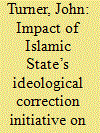

|
|
|
|
|
| Summary/Abstract |
Al Qaeda following 9-11 experienced a period of stagnation which it sought to remedy through a project of re-branding. Critical of this approach, Islamic State claimed that al Qaeda was an elitist organization that had facilitated the stagnation of the Salafi Jihadist project. In an attempted to claim dominance over the jihad, Islamic State’s endeavored to discredit al Qaeda through a process it presented as ideological correction, linked to Islamic eschatology, sectarian agitation, permissive violence, and the caliphate. Following Islamic State’s acquisition of vast territory in Iraq and Syria, arguments proliferated that Islamic State had surpassed al Qaeda. As the caliphate has collapsed what effects will this have on al Qaeda’s fortunes and strategy? It is argued that Islamic State has provided al Qaeda’s strategic approach with renewed vigour to help ensure its survival and pursue resurgence. Al Qaeda acting in concert with the meta-strategy for survival concept, has altered an existential threat into an advantage through disavowing Islamic State’s methods, continuing to engage with localism, and pursuing rebranding by positioning itself as a moderate alternative. The cases of al Qaeda affiliates in Yemen, Syria, West Africa, and South Asia are instructive in assessing the effectiveness of al Qaeda’s resurgence.
|
|
|
|
|
|
|
|
|
|
|
|
|
|
|
|
| 2 |
ID:
091439
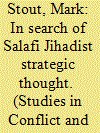

|
|
|
|
|
| Publication |
2009.
|
| Summary/Abstract |
Al Qaeda and its affiliates (AQA) are a loose conglomeration of groups and individuals linked by adherence to a form of Sunni Islam that they call Salafi jihadism. The written works of an intellectually vigorous group of thinkers within AQA show that strategic thought grounded in mainstream global thought on revolutionary warfare exists within this community. A major concern of the strategic thinkers is the extent to which the foot soldiers ignore their prescriptions, engaging in disjointed, counterproductive operations. The U.S. Department of Defense is examining methods by which it might broaden scholarly access to an extensive collection of captured terrorist documents. Such an action would provide fertile grounds for studying this issue.
|
|
|
|
|
|
|
|
|
|
|
|
|
|
|
|
| 3 |
ID:
170971
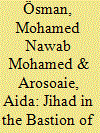

|
|
|
|
|
| Summary/Abstract |
Malaysia has long been hailed as a beacon of moderate Islam. Yet, at present, there is considerable support for ISIS amongst Malaysians, and it represents a unique articulation of contemporary violent Islamist extremism. Malaysians who joined ISIS in Syria and its supporters at home are characterized by a sense of Islamic righteousness. Also, they share distinctive features that differentiate them from the old jihadi generation: a diverse occupational background, the lack of either formal or informal religious training, and the growing nexus of criminality-radicalization. Malaysian support for ISIS can be historically and politically contextualized in relation to the Islamization race between the main political parties, the presence of Salafi-jihadi discourse and ISIS’s discursive construction of authentic Islam.
|
|
|
|
|
|
|
|
|
|
|
|
|
|
|
|
| 4 |
ID:
188088
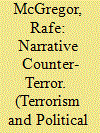

|
|
|
|
|
| Summary/Abstract |
The aim of this article is to explore and evaluate narrative analysis as a counter-terror strategy. Research has demonstrated that both the white supremacist and Muslim fundamentalist calls to global violence are instantiations of a single master narrative, victim, which commits the ingroup to the restoration of utopia by the expulsion or extermination of the outgroup. This study deconstructs texts from American Renaissance and Rumiyah to show that the victim master narrative is underpinned by the concept of deliverance, which combines the desirability of the survival of the ingroup (with its various superior qualities) and the likelihood of destruction by the outgroup (with its vastly superior numbers) to justify resistance, defense, and attack. The expanded and elaborated master narrative is then assessed in terms of its potential to: (1) debilitate extremist recruitment; and (2) transform attempts to reduce global terrorism by providing a soft-power alternative to the unsuccessful hard-power strategies that have characterized twenty-first century counter-terror thus far.
|
|
|
|
|
|
|
|
|
|
|
|
|
|
|
|
| 5 |
ID:
149542
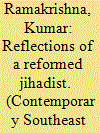

|
|
|
|
|
| Summary/Abstract |
On 29 August 2012, a rehabilitated former senior member of the Jemaah Islamiyah (JI) terror network, Wan Min Wan Mat, delivered a lecture to a group of Malaysian counter-terrorism practitioners in which he sketched out the ideological rationale and aims of the JI network, unpacked in some detail its recruitment and indoctrination philosophy and methodology and also examined what in his personal view are potentially useful strategies for rehabilitating JI militants or preventing the further dissemination of JI extremist ideas. This article examines and evaluates some of the key insights made by Wan Min in his lecture, and argues that his musings are more than mere historical interest in that they have direct relevance to the current struggle against the latest incarnation of the continually evolving violent jihadist threat in Southeast Asia and globally, namely the Islamic State of Iraq and Syria (ISIS or IS). The central reason for this is that the same broad ideology that animated JI — Salafi Jihadism — basically motivates ISIS as well. Hence, even allowing for dissimilarities in time and space, Wan Min’s insights about JI could well provide useful pointers for counter-terrorism practitioners and specialists dealing with the ISIS threat today.
|
|
|
|
|
|
|
|
|
|
|
|
|
|
|
|
| 6 |
ID:
178928
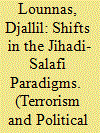

|
|
|
|
|
| Summary/Abstract |
This paper, based on numerous interviews conducted with former jihadists, argues that the emergence of the Islamic State, more than an organizational rift, has led to a major paradigm shift within the jihadi organizations. As such we argue that the Al Qaeda salafi jihadi paradigm, i.e., the “Peshawar paradigm,” has gradually evolved over the years, becoming more in phase with the realities of the battlefield and less dogmatic, explaining this organization’s constant resilience in spite of many setbacks and leading to the rise of a new thinking which we call “the Idelb Paradigm.” Conversely, the ISIS jihadi paradigm, which we call “the Raqqa Paradigm,” stems from the Takfiri school of thought. While not new and already present in the 1980s in Afghanistan, the Takfiri school of thought has been gaining momentum over the years and emerged as a major to the Al Qaeda one. This schism is likely to have a long-term effect on the strategies and alliances of the respective affiliates of both Al Qaeda and ISIS.
|
|
|
|
|
|
|
|
|
|
|
|
|
|
|
|
|
|
|
|
|